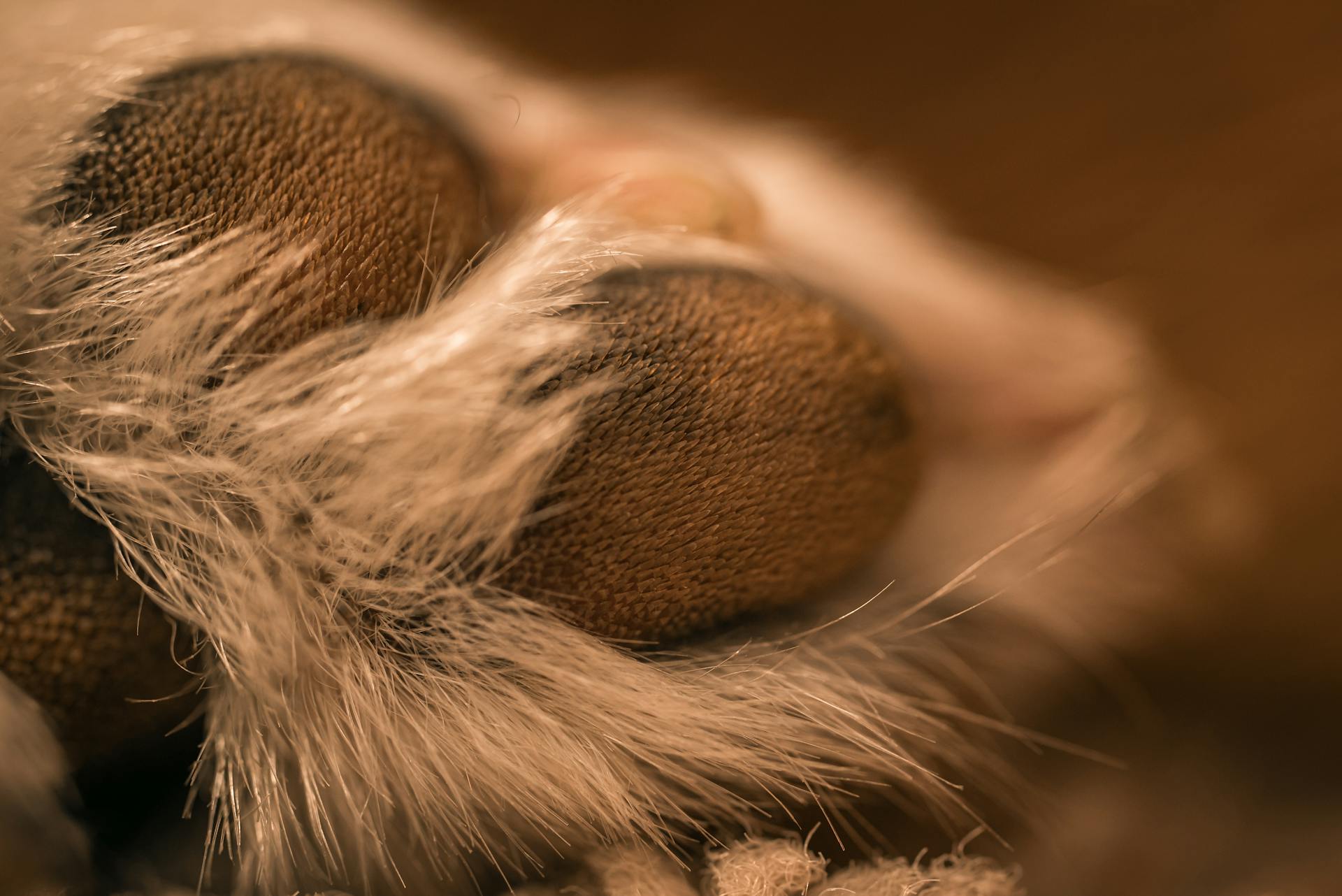
Paw licking in dogs is a common issue that can be caused by allergies. According to research, 10% of dogs suffer from allergies, and paw licking is a common symptom.
Dogs can develop allergies to a variety of substances, including environmental allergens, food, and contact allergens. In fact, studies have shown that dogs are more likely to develop allergies to environmental allergens, such as pollen and dust mites.
Identifying the underlying cause of paw licking is crucial in developing an effective treatment plan. By understanding the specific allergen causing the issue, pet owners can take steps to prevent and alleviate their dog's symptoms.
Suggestion: Environmental Allergies in Dogs
Causes of Paw Licking
Paw licking in dogs can be caused by a variety of factors. Allergies are a common culprit, and can be triggered by food, environmental allergens, or even the dog's own skin.
Some common allergens that can cause paw licking include flea saliva, pollen, and dust mites. Food allergies can also be a problem, and may be caused by ingredients such as beef, dairy, or wheat.
The symptoms of allergies can include itchy paws, hot spots, and excessive licking. If you suspect your dog has allergies, you can try giving them a small amount of Benadryl, but be sure to consult with your veterinarian first.
Here are some common causes of paw licking in dogs:
- Flea allergy dermatitis
- Food allergies
- Environmental allergies
- Parasites
- Foreign bodies
- Behavioral issues
- Autoimmune disorders
- Hormonal disorders
- Metabolic disorders
- Nutritional disorders
- Fungal infections
It's essential to rule out other underlying problems and work with your veterinarian to determine the cause of your dog's paw licking and develop a treatment plan.
Environmental Allergies
Environmental allergies are a common cause of paw licking in dogs. They can be triggered by substances like pollen, dust, mold, and certain types of grass or plants.
Dogs with environmental allergies may exhibit symptoms like excessive licking, ear scratching, and hot spots. If you notice your dog licking their paws more frequently during certain times of the year, it could be a sign of seasonal allergies.
Some common environmental allergens include grass, pollen, mold, and dust mites. Your dog may also be allergic to certain ingredients in their diet or to forage mites found in dry food.
Related reading: Home Remedies for Seasonal Allergies in Dogs
If you suspect your dog has an environmental allergy, consider using a supplement high in omega-3 to help strengthen their skin's allergen barrier. This can help reduce inflammation and itching associated with allergies.
Here are some signs of environmental allergies in dogs:
- Excessive paw licking
- Ear scratching and hot spots
- Itchiness
- Hives
- Swelling in the affected areas
- Red, inflamed skin
If you notice any of these symptoms, consult with your veterinarian to rule out other underlying causes and develop a treatment plan.
Dry Skin
Dry skin can be a symptom of an underlying health issue, so it's essential to monitor your dog's overall health. Only a veterinarian can determine the cause of dry skin in dogs.
Dry skin can be uncomfortable for dogs, leading to excessive licking and chewing at the affected area. This behavior can sometimes be a sign of an underlying skin issue.
Be aware of any other health symptoms your dog may be showing alongside their dry skin for a more accurate diagnosis.
A unique perspective: Dog Paw Health
Parasites
Parasites can cause the paws to be very itchy. This is especially true for flea allergy dermatitis, a reaction to flea bites that's common in some dogs.
Flea allergy dermatitis is caused by an allergy to flea saliva. This can lead to symptoms like fur loss, redness, and hot spots.
Your veterinarian can recommend treatments to eliminate parasites, which should relieve the itching.
Intriguing read: Home Remedies for Dogs with Flea Allergies
Signs and Diagnosis
If your dog starts licking their paws excessively, it's essential to seek veterinary advice promptly. Waiting can lead to difficult-to-treat infections and other perpetuating factors.
Common signs of paw licking in dogs include licking and chewing the paws, redness, hair loss, hyperpigmentation, brown saliva stains on the hair around the paw, thickening of the skin or pads, draining tracts, scaling, lameness, poor appetite, and lethargy.
Your veterinarian will take a detailed medical history, conduct a thorough physical exam, and run diagnostic tests to determine the underlying cause of the paw licking. This may involve taking skin samples, blood work, endocrine analysis, or X-rays to detect foreign bodies.
Signs
If your dog starts licking or chewing their paws a lot, it's a sign of itchiness and discomfort.
Redness on the paws is another common sign to watch out for. Dr. Rosales explains that a dog owner may not think to separate and look between the toes for signs of inflammation.

Hair loss, hyperpigmentation, and brown saliva stains on the hair around the paw are all possible signs of pododermatitis.
Thickening of the skin or pads, draining tracts, scaling, lameness, poor appetite, and lethargy are also signs to be aware of.
You can keep an eye out for these signs by regularly inspecting your dog's paws. Check for splinters, ticks, or other things that might be causing discomfort.
Here are some common signs of allergies that might be contributing to excessive paw licking:
- Itchiness
- Hives
- Swelling in the affected areas
- Red, inflamed skin
If you suspect your dog has allergies, you can try giving them a small amount of Benadryl, but be sure to consult with your vet first.
Allergies
Allergies can be a real challenge for dog owners. Many things can cause allergies and increased paw licking in dogs, including grass, chemicals like pesticides, cleaning supplies in your home, and their food.
Some common symptoms of allergies in dogs include itchiness, hives, swelling in the affected areas, and red, inflamed skin.
If you suspect your dog has allergies, you can try giving them a small amount of Benadryl. The recommended dosage is 2 to 4 mg/kg, or 0.9 to 1.8 mg per pound.
Excessive paw licking is just one symptom of allergies. Other signs include itching all over the body, hot spots, and gastrointestinal symptoms like diarrhea, gas, indigestion, stomach pain, or bacterial yeast infections.
Here's a list of common allergens that can cause paw licking in dogs:
- Grass
- Chemicals like pesticides
- Cleaning supplies in your home
- Their food
Flea allergy dermatitis is another common cause of allergies in dogs. If your dog is allergic to flea saliva, they may scratch and lick excessively, leading to symptoms like fur loss, redness, and hot spots.
Atopic dermatitis, or environmental allergies, is an inherited predisposition to develop allergic symptoms following repeated exposure to environmental allergens like dust, pollen, mold, grasses, and other triggers.
If this caught your attention, see: Symptoms of Allergies to Dogs
Treatment and Prevention
Treatment for pododermatitis usually involves dealing with secondary infections and establishing a treatment plan for the primary cause. Your veterinarian will work with you to determine the best course of action.
You might enjoy: Lick Granuloma Dog Home Treatment
Administering antibiotics and antifungal medication can help treat secondary bacterial or yeast infections that often cause itchiness, inflammation, and pain. This can offer immediate comfort to your dog while you work on a treatment plan for the primary cause.
Treating primary causes of pododermatitis can involve a range of options, including individual or combination drug therapies, topical creams, pain management, and lifestyle changes. Your veterinarian will work with you to determine the best treatment plan for your dog's specific needs.
Regular foot baths with medicated shampoo can make a big difference in managing symptoms and discomfort. This can be especially helpful for dogs with food and contact hypersensitivities.
Washing your dog's paws regularly can help prevent excessive licking caused by allergies, blisters, or injuries. Try giving your dog regular foot baths in water and povidone-iodine, diluting the povidone-iodine until it looks like iced tea.
Taking care of your dog's paws is essential in preventing excessive licking. Wash and dry their paws when they come in from a walk to protect them from environmental irritants and allergens.
Broaden your view: Female Dog Excessive Licking
Complications and Risks
Paw licking in dogs can lead to bacterial yeast infections, which cause itchy, irritated, and red paws.
The moisture from constant foot licking can cause a secondary bacterial or yeast infection, resulting in even more itching, redness, swelling, and licking.
This vicious cycle can seriously endanger your pet's health if left unchecked.
For more insights, see: Does Chicken Fat Cause Allergies in Dogs
Infection Risk
Infection risk is a serious concern for dogs that excessively lick their paws. If this behavior continues, your dog might be at risk of developing bacterial yeast infection or bacterial fungal infection.
A yeast infection will cause itchy, irritated, and red paws in your pet, which can lead to a vicious cycle of licking and itching.
Secondary bacterial or yeast infections are common in dogs with pododermatitis, and they can cause even more itching, redness, swelling, and licking. These infections can affect one or multiple paws, and sometimes different types of infection affect different paws.
Infection can be superficial or deep, and it's essential to address the problem and illuminate the cause as soon as possible. Topical anti-itch sprays, steroids to reduce inflammation, antibiotics for bacterial infections, or antifungals for yeast infections may be prescribed by your veterinarian to relieve your dog's itching.
Treating secondary causes, such as infections, is crucial to prevent the problem from worsening and to offer comfort to your dog. Typically, treating any secondary infection involves administering antibiotics and sometimes antifungal medication.
Blisters and Cysts

Blisters and Cysts can be a real problem for your furry friend. Excessive licking can cause blisters, which in turn causes your dog to keep licking.
Over-exercise and walking on hot surfaces are also common causes of blisters.
Blisters or cysts are usually easy to identify in good lighting, especially when your dog is calm and you can examine their paws, including between their toes.
If you suspect your dog is licking their paws because of blisters, you may be able to treat it at home by cleaning the area and applying ointment, according to Dr. Greg Martinez, DVM.
When to See a Vet
If your dog starts licking their paws more often, it's a good idea to see the vet. This is a common sign of an underlying issue that needs attention.
Paw licking can quickly become a serious problem, as seen in the case of a bulldog whose paws were split open, exposing muscles and tendons.
It's best to see a vet sooner rather than later, as delays can make a difficult case even more challenging to treat.
If your dog is hurting themselves while licking their paws, it's time to schedule a vet visit.
Sources
- https://www.mobilepetvet.com/why-is-my-dog-licking-his-paws/
- https://petzpark.com.au/blogs/petz-park-blog/dog-paw-licking-why-does-it-happen-and-how-do-i-fix-it
- https://www.akc.org/expert-advice/health/pododermatitis-in-dogs/
- https://www.akc.org/expert-advice/health/why-does-my-dog-lick-chew-paws/
- https://www.newsweek.com/why-do-dogs-lick-paws-1831561
Featured Images: pexels.com


